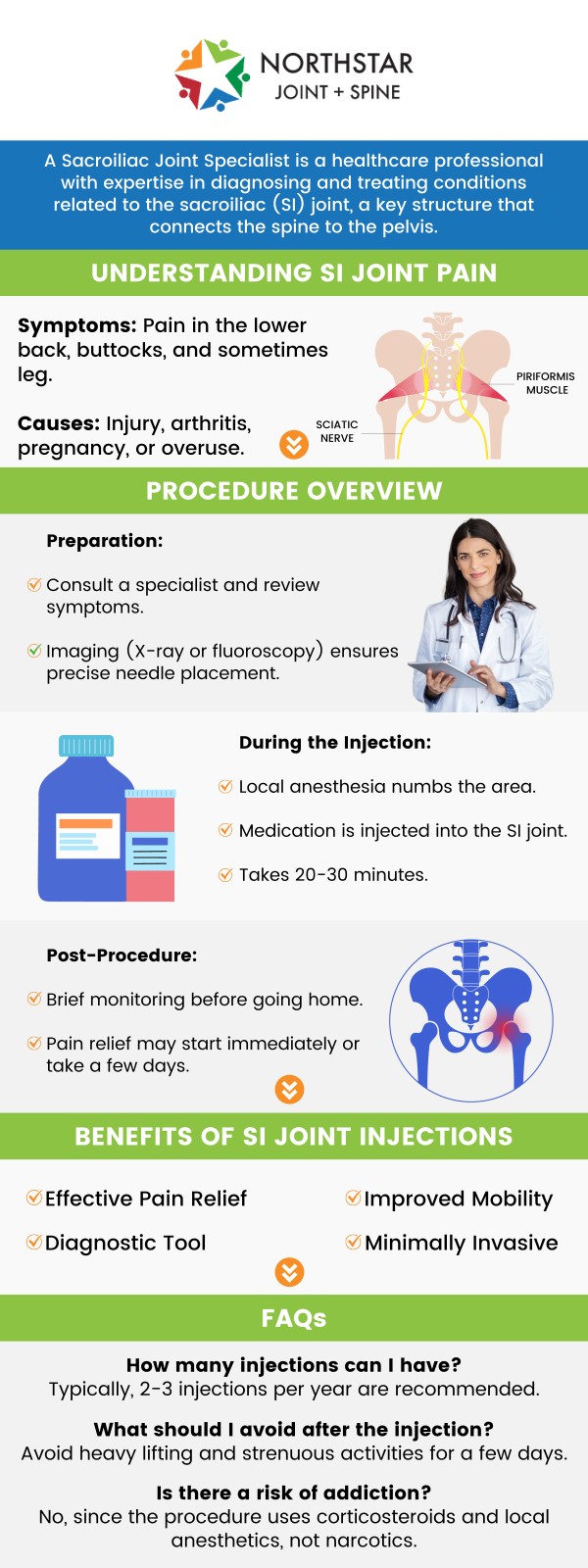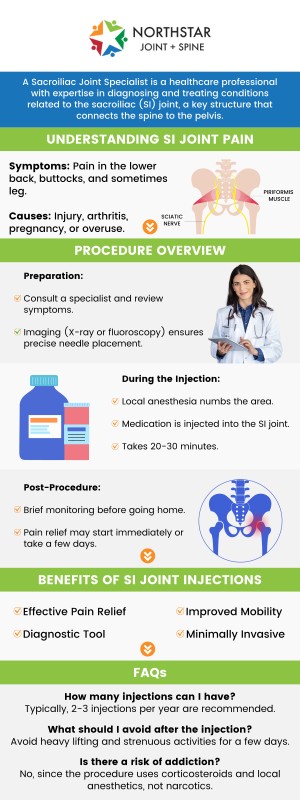How Long Does Sacroiliitis Last?
The duration of sacroiliitis varies depending on the underlying cause and the effectiveness of treatment. In many cases, with appropriate care, symptoms may improve within a few weeks to months. However, for chronic or severe cases, sacroiliitis may persist longer and require ongoing management to control pain and inflammation. Board-Certified Dr. Robert J. Nocerini, MD, at Northstar Joint and Spine provides personalized treatment plans to help manage sacroiliitis and improve quality of life. For more information, please contact us today or schedule an appointment online. We are conveniently located at 7704 San Jacinto Pl Suite #200 Plano, TX 75024.


Table of Contents:
How long does sacroiliitis typically last?
Can sacroiliitis become a chronic condition?
How long does it take for sacroiliitis pain to improve with treatment?
What factors affect how long sacroiliitis lasts?
When Should Patients See Dr. Robert J. Nocerini for Persistent Sacroiliitis Pain?
At Northstar Joint and Spine, we understand that the duration and impact of sacroiliitis—an inflammation of one or both sacroiliac joints at the base of the spine—can vary widely among our patients. The length of time you may experience symptoms often depends on the underlying cause, the severity of inflammation, and how quickly specialized treatment is initiated.
Acute vs. Chronic Sacroiliitis. For some patients, sacroiliitis presents as an acute condition and may resolve within a few days to several weeks with prompt intervention. However, when sacroiliitis is associated with chronic conditions such as ankylosing spondylitis or other inflammatory arthritides, symptoms can persist for several months or become a long-term health concern requiring ongoing management.
Tailored Treatment for Lasting Relief
At Northstar Joint and Spine, our multidisciplinary team offers comprehensive evaluation and a personalized treatment plan for each patient. Many individuals with mild or acute sacroiliitis experience significant relief within weeks of starting appropriate therapies, which may include targeted medications, advanced physical therapy, and lifestyle modifications. For those with chronic or autoimmune-related sacroiliitis, our goal is to help you manage flare-ups and remissions effectively, minimizing discomfort and maximizing function.
Why Early Diagnosis Matters
Early diagnosis and a customized treatment plan are key to reducing the duration and severity of sacroiliitis symptoms. Our team works closely with you to identify the root cause and design the most effective course of treatment, whether your condition is acute or chronic.
If you are experiencing low back or pelvic pain and suspect sacroiliitis, contact Northstar Joint and Spine. Our specialists are committed to helping you achieve the best possible outcome and improve your quality of life.
At Northstar Joint and Spine, we specialize in diagnosing and treating painful conditions of the spine and joints, including sacroiliitis. Sacroiliitis refers to inflammation of one or both of the sacroiliac joints, which connect the lower spine to the pelvis. While this inflammation can be triggered by specific infections or underlying medical conditions, it may sometimes become a chronic issue.
Chronic sacroiliitis is defined by symptoms such as lower back pain, pelvic discomfort, and stiffness that persist for three months or longer. The pain often varies in intensity and can significantly interfere with daily activities and quality of life.
Several factors may contribute to chronic sacroiliitis, including autoimmune disorders like ankylosing spondylitis, repetitive stress, and infections. At Northstar Joint and Spine, our team has extensive experience identifying these causes and tailoring treatment plans to address each patient’s unique needs.
Why Early Diagnosis Matters
Early diagnosis and comprehensive management are crucial for controlling pain and minimizing joint damage. Our specialists use advanced imaging and diagnostic techniques to accurately evaluate sacroiliac joint inflammation. This allows us to create individualized treatment strategies focused on improving mobility and reducing discomfort.
Personalized Care for Lasting Relief
Treatment at Northstar Joint and Spine may include:
• Medications to reduce inflammation and manage pain
• Physical therapy to strengthen supporting muscles and restore joint function
• Lifestyle guidance to help minimize stress on the sacroiliac joints
• Image-guided injections or other interventional procedures for targeted relief
If you are experiencing ongoing lower back or pelvic pain, don’t wait for symptoms to worsen. Our compassionate team at Northstar Joint and Spine is here to provide expert evaluation and state-of-the-art care to help you regain function and reclaim your quality of life.
At Northstar Joint and Spine, we understand that every patient’s experience with sacroiliitis is unique. The time it takes for sacroiliitis pain to improve with treatment varies depending on the underlying cause, severity of inflammation, your overall health, and the specific therapies used.
Our team typically begins with a comprehensive evaluation to determine the most effective treatment plan for you, which may include a combination of medications such as nonsteroidal anti-inflammatory drugs (NSAIDs), targeted physical therapy, and personalized lifestyle recommendations. Many patients at Northstar Joint and Spine start to notice an improvement in symptoms within a few days to a couple of weeks after starting treatment. However, for those with more severe or chronic sacroiliitis, it may take several weeks to a few months to achieve significant relief.
If your sacroiliitis is associated with an underlying condition—such as ankylosing spondylitis or another inflammatory arthritis—our specialists may recommend ongoing management and long-term therapies to help control symptoms and minimize flare-ups.
It is important to follow your Northstar Joint and Spine provider’s recommendations and attend all scheduled follow-up visits to monitor your progress and adjust your treatment plan as needed. If your pain does not improve or worsens despite treatment, our team will conduct further evaluations and discuss additional options to help you find relief.
At Northstar Joint and Spine, we understand that sacroiliitis—the inflammation of one or both sacroiliac joints—can have a significant impact on your daily life. The duration and recovery from sacroiliitis can vary widely based on several factors, and our team is dedicated to helping you achieve the best possible outcome.
What Influences the Duration of Sacroiliitis?
• Underlying Cause: The root cause of sacroiliitis is a major factor in how long symptoms last. However, sacroiliitis associated with chronic inflammatory conditions, such as ankylosing spondylitis, may persist for years or even become a lifelong issue.
• Timely, Specialized Care: Seeking prompt, expert medical attention at Northstar Joint and Spine can make a significant difference. Early diagnosis and intervention—using a personalized combination of medication, physical therapy, and lifestyle modification—can help reduce pain, speed up recovery, and lower the risk of chronic symptoms.
• Severity of the Condition: The extent of inflammation and any joint damage at the time of your first visit will also influence recovery time. Mild cases often heal more quickly, while severe or long-standing inflammation may require a longer treatment plan and ongoing management.
• Individual Health Factors: Your overall health—including factors like physical fitness, weight, and the presence of other medical conditions—can affect your body’s ability to recover. Our providers at Northstar Joint and Spine take a comprehensive approach, considering your unique health profile to tailor your treatment.
• Commitment to Treatment: Following your personalized care plan—including prescribed exercises, recommended therapies, and activity modifications—is crucial for optimal healing. Our team will work closely with you to support your progress every step of the way.
• Lifestyle Choices: Healthy habits such as not smoking, managing stress, and maintaining good sleep hygiene can promote recovery, while unhealthy habits can delay healing. We provide guidance and resources to help you make positive lifestyle changes that benefit your joint health.
Partnering with You for Lasting Relief
Sacroiliitis is a complex condition, but with the right support and expertise, many patients experience significant improvement. At Northstar Joint and Spine, our goal is to provide you with comprehensive, compassionate care—helping you return to a more active, pain-free life as quickly as possible. If you are experiencing symptoms of sacroiliitis, schedule a consultation with our experienced team today to begin your journey toward recovery.
Patients experiencing persistent sacroiliitis pain should consider seeing Dr. Robert J. Nocerini, MD, when the pain does not improve with rest, over-the-counter medications, or physical therapy. Sacroiliitis, an inflammation of the sacroiliac joint located at the base of the spine, can cause discomfort in the lower back, hips, and legs. If the pain persists for several weeks or becomes more severe, it is essential to seek medical attention to prevent it from worsening and affecting daily activities.
Dr. Nocerini specializes in diagnosing and treating conditions like sacroiliitis. He offers comprehensive care, starting with a thorough evaluation to identify the root cause of the pain. With his expertise, Dr. Nocerini uses advanced diagnostic tools to accurately assess the condition and develop a personalized treatment plan. If conservative treatments are ineffective, Dr. Nocerini may recommend more advanced options, such as injections or other pain management therapies, to help patients achieve relief and regain mobility. For more information, contact us today or schedule an appointment online. We are conveniently located at 7704 San Jacinto Pl Suite #200 Plano, TX 75024. We serve patients from Plano TX, Willow Bend TX, Frisco TX, Allen TX, Addison TX, North Dallas TX, and surrounding areas.

Check Out Our 5 Star Reviews


Additional Services You May Need
▸ Back Pain
▸ Shoulder Pain
▸ Chronic Pain
▸ Epidural Steroid Injections
▸ Spinal Cord Stimulation
▸ Viscosupplementation
▸ Genicular Nerve Blocks
▸ Facet Injections
▸ Joint Injections
▸ Sacroiliac Joint Injections
▸ Lumbar and Cervical
▸ Facet Medial Branch Blocks
▸ Diagnostic Nerve Blocks
▸ Medication Management
▸ Neck Pain Doctor
▸ Diabetic Peripheral Neuropathy
▸ Headaches
▸ Suboxone
▸ Peripheral Nerve Stimulation
▸ Spine
▸ Joints
▸ Muscles
▸ Bones

Additional Services You May Need
▸ Back Pain
▸ Shoulder Pain
▸ Chronic Pain
▸ Epidural Steroid Injections
▸ Spinal Cord Stimulation
▸ Viscosupplementation
▸ Genicular Nerve Blocks
▸ Facet Injections
▸ Joint Injections
▸ Sacroiliac Joint Injections
▸ Lumbar and Cervical
▸ Facet Medial Branch Blocks
▸ Diagnostic Nerve Blocks
▸ Medication Management
▸ Neck Pain Doctor
▸ Diabetic Peripheral Neuropathy
▸ Headaches
▸ Suboxone
▸ Peripheral Nerve Stimulation
▸ Spine
▸ Joints
▸ Muscles
▸ Bones






